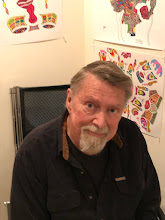.
With an impending IPO we are once again knee-deep in all things Facebook. Part of that frenzy is an interesting article in PC World about how to block Facebook's new Timeline feature. That feature, on the off chance you have managed to avoid hearing about it, is an unfolding womb-to-tomb dossier that records in excruciating detail and precise chronological order every post, picture, like, dislike, poke, twiddle and bleep that you have ever entered on Facebook. The article's author, Sarah Jacobsson Purewal, was apparently concerned about the ease with which others could jump back years, into the midst of her posts as a less circumspect youngster. The steps necessary to bar that door are absolutely byzantine. For me it was a "be careful what you ask for" moment. You see, almost exactly 7 years ago I wrote an article in Flow asking for such a device. I was asking for a digital "trunk in the attic." Let me quote myself:
The gradual, expressive, maturing of the digital environment makes me hopeful that an old communicative fantasy of mine may be edging toward reality. I have always been delighted by the creativity of others. Nothing gives me more pleasure than to be in the presence of another’s insight or expression and find myself reduced to a state of delighted confusion: How did they do that? And, how did they even think of that? The desire for real answers to those questions often drives me to Google to find an author’s or artist’s or musician’s or scientist’s email address and ask them. You would be amazed at how often they respond. The problem, of course, is that on occasion they have been so rude as to die before answering my questions – sometimes decades ago.
The frustration of their ultimate inaccessibility always reignites my desire for a “virtual biography.” I want to know what Einstein ate, what the streets he walked along looked like. I want to share the music to which Georgia O’Keeffe listened; I want to hear the sounds of London that Shakespeare heard. I want to be able to participate in some way in the experiential reality that must have shaped the creative flame within those souls. And I want to feel the firelight and hear the wind that whipped around the farmhouse winter nights in South Dakota when my father was a boy. I want to see the pages of the books that entranced my mother as a young girl in rural Pennsylvania. I want interactive, real time biographies that move beyond words on a page or flickering images sprung from the imagining of filmmakers and TV producers.
Such living histories would be incredibly difficult and expensive to create. To reassemble the past from fragments of mostly discarded data, to attempt to reconstruct from them a facsimile of the creative, reflective, experiential reality of one long dead is a daunting, if not impossible, task. However, assembling such works to chronicle lives in the present, using digital technology, has become surprisingly feasible.
Think about it. All you really need is a “capture device” – something that can record the visual, auditory and textual experiences of a life, a “structuring device” – something that allows one to edit, order and organize those collected experiences, a “storage device” – someplace to store both the collected data and the constructed representations, and a “publishing-distribution device” – something that allows for the sharing of the constructed representations with others.
In short, all you needed was Facebook. Of course, at the time Facebook was barely a year old and was primarily a tool that let socially challenged Ivy League college students hook up. So I look at Timeline with a kind of horrified fascination: "No! No! That is not what I meant, that is not what I meant at all!" What I envisioned for the "Digital Trunk in the Attic," or my later, more intricate, notion of a "Legacy Library" was employing the power of digital technology to capture the insights of those among us who have enriched the human condition with beauty and wisdom. Funny cats, dancing hamsters, or dancing drunks - these were not the artifacts I had in mind.
As the Republican primary unfolds around us with all its hedge-funded hoopla, I cannot help but recall the 1988 Vice-Presidential debates when Lloyd Benson chided Dan Quayle, "You, Senator, are no Jack Kennedy." So I say to Facebook's Timeline: "I proposed the Legacy Library. The Legacy Library was a friend of mine. You, sirrah, are no Legacy Library, you are no digital trunk in the attic!"
Whew. Now I feel better.
.

No comments:
Post a Comment